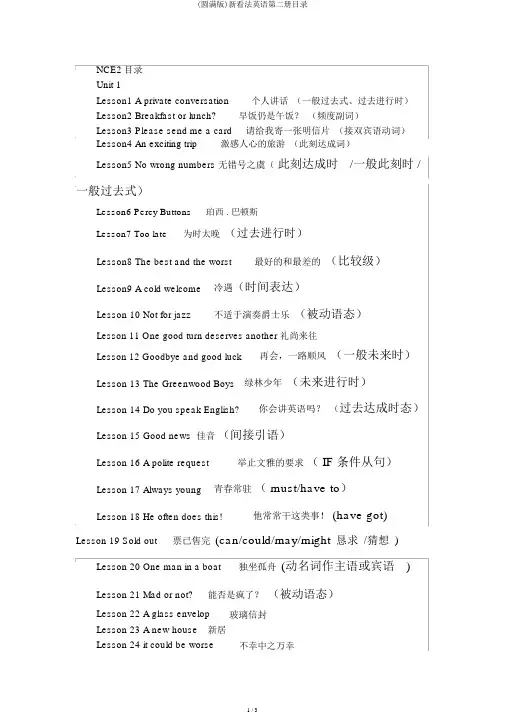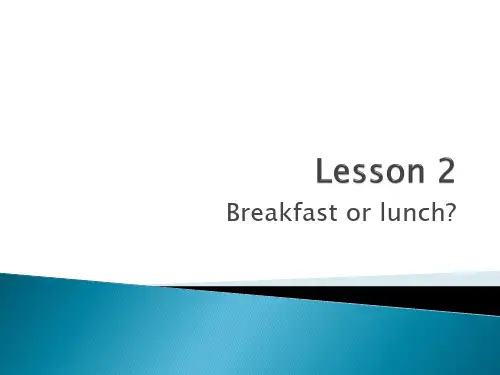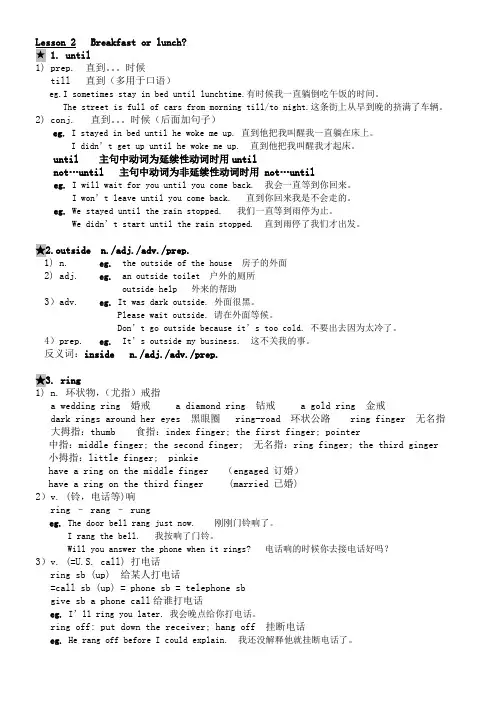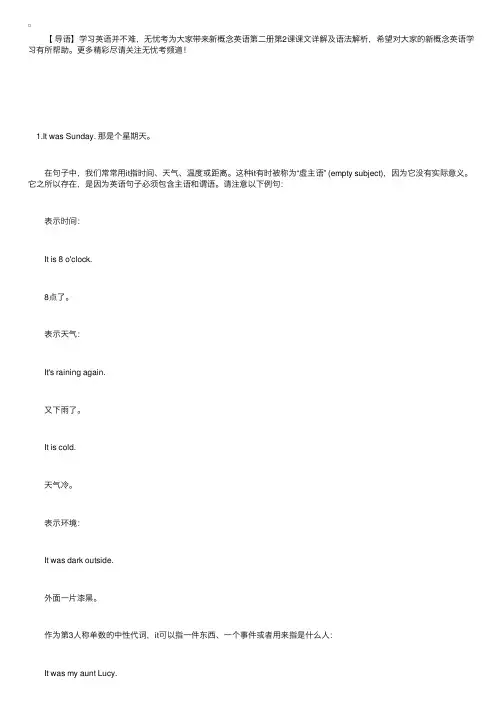新概念英语2第二课 NCE2_Lesson02
(完整版)新概念英语第二册目录

NCE2目录Unit 1Lesson1 A private conversation个人讲话(一般过去式、过去进行时)Lesson2 Breakfast or lunch?早饭仍是午饭?(频度副词)Lesson3 Please send me a card请给我寄一张明信片(接双宾语动词)Lesson4 An exciting trip激感人心的旅游(此刻达成词)Lesson5 No wrong numbers 无错号之虞(此刻达成时/一般此刻时 /一般过去式)Lesson6 Percy Buttons珀西 . 巴顿斯Lesson7 Too late为时太晚(过去进行时)Lesson8 The best and the worst最好的和最差的(比较级)Lesson9 A cold welcome冷遇(时间表达)Lesson 10 Not for jazz不适于演奏爵士乐(被动语态)Lesson 11 One good turn deserves another礼尚来往Lesson 12 Goodbye and good luck再会,一路顺风(一般未来时)Lesson 13 The Greenwood Boys绿林少年(未来进行时)Lesson 14Do you speak English?你会讲英语吗?(过去达成时态)Lesson 15 Good news 佳音(间接引语)Lesson 16A polite request举止文雅的要求( IF 条件从句)Lesson 17Always young青春常驻( must/have to)Lesson 18He often does this!他常常干这类事! (have got) Lesson 19 Sold out票已售完(can/could/may/might恳求/猜想) Lesson 20 One man in a boat独坐孤舟(动名词作主语或宾语) Lesson 21 Mad or not?能否是疯了?(被动语态)Lesson 22 A glass envelop Lesson 23 A new house新居Lesson 24 it could be worse 玻璃信封不幸中之万幸Unit 2Lesson 25 Do the English speak English?英国人讲的是英语吗?Lesson 26 The best art critics最正确美术谈论家Lesson 27 A wet night雨夜Lesson 28 No parking严禁泊车Lesson 29 Taxi! 出租汽车!Lesson 30 Football or polo?足球仍是水球?Lesson 31 Success story成功者的故事Lesson 32 Shopping made easy购物变得很方便Lesson 33 Out of the darkness冲出黑暗Lesson 34 Quick work破案“神速”Lesson 35 Stop thief!捉贼!Lesson 36 Across the Channel横渡大海Lesson 37 The Olympic Games 奥林匹克运动会Lesson 38 Everything except the weather独一没有考虑到天气Lesson 39 Am I all right?我能否康复?Lesson 40 Food and talk进参加讲话Lesson 41 Do you call that a hat?你把那个叫帽子吗?Lesson 42 Not very musical 其实不是很懂音乐Lesson 43 Over the South Pole飞越南极Lesson 44 Through the forest穿过丛林Lesson 45 A clear conscience心安理得Lesson 46 Expensive and uncomfortable既昂贵又遭罪Lesson 47 A thirsty ghost嗜酒的鬼魂Lesson 48 Did you want to tell me something?你想对我说什么吗?Unit 3Lesson 49 The end of the dream美梦告终Lesson 50 Taken for a ride搭车兜风Lesson 51 Reward for virtue对美德的奖励Lesson 52 A pretty carpet美丽的地毯Lesson 53 Hot snake 触电的蛇Lesson 54 Sticky fingers黏糊的手指Lesson 55 Not a gold mine其实不是金矿Lesson 56 Faster than sound比声音还快!Lesson 57 Can I help you,madam?你要买什么,夫人?Lesson 58 A blessing in disguise?是因祸得福吗?Lesson 59 In or out?进来仍是出去?Lesson 60 The future卜算未来Lesson 61 Trouble with the Hubble哈勃望远镜的窘境Lesson 62 After the fire大火今后Lesson 63 She was not amused她其实不感觉可笑Lesson 64 The Channel Tunnel海峡地道Lesson 65 Jumbo verse the police小象对警察Lesson 66 Sweet as honey!像蜜同样甜!Lesson 67 Volcanoes火山Lesson 68 Persistent纠葛不休Lesson 69 But not murder!其实不是谋杀!Lesson 70 Red for danger危险的红色Lesson 71 A famous clock一个有名的大钟Lesson 72 A car called Bluebird“蓝鸟”汽车Unit 4Lesson 73 The record-holder记录保持者Lesson 74 Out of the limelight舞台以外Lesson 75 SOS 呼救信号Lesson 76 April Fools’ day 愚人节Lesson 77 A successful operation一例成功的手术Lesson 78 The last one?最后一枝吗?Lesson 79 By air乘飞机Lesson 80 The Crystal Palace水晶宫Lesson 81 Escape脱逃Lesson 82 Monster or fish?是妖仍是鱼?Lesson 83 After the elections大选今后Lesson 84 On strike停工Lesson 85 Never too old to learn活到老学到老Lesson 86 Out of control时控Lesson 87 A perfect alibi极好的不在犯法现场的凭证Lesson 88 Trapped in a mine困在矿井里Lesson 89 A slip of the tongue口误Lesson 90 What ’sfor supper?晚饭吃什么?Lesson 91 Three men in a basket三人同篮Lesson 92 Asking for trouble自找麻烦Lesson 93 A noble gift崇敬的礼品Lesson 94 Future champions未来的冠军Lesson 95 A fantasy纯属虚假Lesson 96 The dead return亡灵回乡。
新概念英语2第二课 详细版

working? 现在进行时的用法 1) 表示说话(shuō huà)时正在发生或者进行的动作 Please don’t make so much noise, I’m studying. Let’s get out. It isn’t raining. 2) 表示在现在相对较长一段时间内正在进行的动作,但是说话(shuō huà)一
课文讲解
精品PPT
new words
n until prep. 直到; 直到…为止 n not until 直到…才; n 肯定形式表示的意思是“做某事直至某时”,动词必须是延续性的。 n 否定形式表达的意思是“直至某时才做某事”。动词为延续性或非延续性
都可以。 n His father was alive until he came back. n 直到他回来为止,他爸爸(bà bà)都是活着的。 n His father didn’t die until he came back. n 直到他回来,他爸爸(bà bà)才死。
精品PPT
课文(kèwén)精读
1.get up 起床 stay up 熬夜 wake up醒来 2.时间介词(jiècí) 2.1on加星期,具体的时间 星期词汇 星期一:Monday 星期二:Tuesday 星期三:Wednesday星期四:Thursday 星期五:Friday 星期六:Saturday 星期日:Sunday
I am leaving this afternoon.
The train is arriving in half an hour.
[全]新概念英语(第2册第2课)详解
![[全]新概念英语(第2册第2课)详解](https://uimg.taocdn.com/f44b786edd3383c4bb4cd2ef.webp)
新概念英语(第2册第2课)详解新Lesson 2 (标★者核心解析)1. ★until [ən'til, ʌn'til] prep.直到2. ★outside [aut'said] ad.外面3. ★ring [riŋ] v.(铃、电话等)响4. aunt [ɑ:nt] n.姑,姨,婶,舅妈5. ★repeat [ri'pi:t] v.重复;重说1. until [ən'til] prep.直到。
作介词及连词preposition, conjunction一、基本词义及用法————————————————1 up to the time that,到…时;直到…时,用语肯定句I was up until three o'clock trying to get it finished! 为了完成工作,我一直干到3点!We had better wait until Antony's here? 我们最好等到安东尼来。
————2 not until not before a particular time or event 直到…才。
用语否定句。
We didn't eat till past midnight. 直到过了午夜我们才吃东西。
What ever we do, won't stop until it's finished. 不论做什么,我们都不会半途而废。
——————3. 常见定势思维❌错误:(1)COMMONLEARNER ERROR: until now or so far?Warning: choose the correct adverb! 注意:選擇正確的副詞!(A)Use 'until now' to talk about a situation that existed, but has just ended: ‘until now’用於表示剛剛結束的過去的某種情況。
NCE2-2新概念二册第二课

(1) look after 照料 My friend looked after my cat while I was on holiday. Robert's old enough to look after himself. (2) look down on 轻视,看不起
(3) look forward to 盼望;期待: We are all looking forward to our holiday. I'm looking forward to seeing you this summer vacation.
sight 在用于表示风景时,一般有修饰语来说明“特征”,从而 使视觉所接受的印象更为明确,更为具体。 …but it suddenly caught sight of the drunk. 但是那公牛 突然看到了那个酒汉。 …you can enjoy the extraordinary sight of unbroken cloud plains… …… 你可以欣赏那连绵不断的云海的非凡景象……
glance 的原义是“闪现”,如活动着的反光物体在阳 光下的闪烁,后来慢慢演变为“迅速的看”这一含义 He took a glance at it briefly, and then he told me to look again. 他向它略略瞟了一眼,然后叫我再看看。
glimpse 既可表示瞥一眼的行为,又可表示瞥一眼 所看到的东西 When he began to play a tune, we had our first glimpse of the snake. 当他开始吹一支曲子时,我们第一次瞥见了那条蛇。
裕兴 新概念英语 第二册 Lesson 2 第2课 笔记讲义

直到。
时候till 直到(多用于口语)eg.I sometimes stay in bed until lunchtime.有时候我一直躺倒吃午饭的时间。
The street is full of cars from morning till/to night.这条街上从早到晚的挤满了车辆。
2)conj. 直到。
时候(后面加句子)eg. I stayed in bed until he woke me up. 直到他把我叫醒我一直躺在床上。
I didn’t get up until he woke me up. 直到他把我叫醒我才起床。
until 主句中动词为延续性动词时用untilnot…until 主句中动词为非延续性动词时用 not…untileg. I will wait for you until you come back. 我会一直等到你回来。
I won’t leave until you come back. 直到你回来我是不会走的。
eg. We stayed until the rain stopped. 我们一直等到雨停为止。
We didn’t start until the rain stopped. 直到雨停了我们才出发。
★2.outside n./adj./adv./prep.1) n. eg. the outside of the house 房子的外面2) adj. eg. an outside toilet 户外的厕所outside help 外来的帮助3)adv. eg. It was dark outside. 外面很黑。
Please wait outside. 请在外面等候。
Don’t go outside because it’s too cold. 不要出去因为太冷了。
4)prep. eg. It’s outside my business. 这不关我的事。
新概念英语第二册第2课课文详解及语法解析

【导语】学习英语并不难,⽆忧考为⼤家带来新概念英语第⼆册第2课课⽂详解及语法解析,希望对⼤家的新概念英语学习有所帮助。
更多精彩尽请关注⽆忧考频道! 1.It was Sunday. 那是个星期天。
在句⼦中,我们常常⽤it指时间、天⽓、温度或距离。
这种it有时被称为“虚主语” (empty subject),因为它没有实际意义。
它之所以存在,是因为英语句⼦必须包含主语和谓语。
请注意以下例句: 表⽰时间: It is 8 o'clock. 8点了。
表⽰天⽓: It's raining again. ⼜下⾬了。
It is cold. 天⽓冷。
表⽰环境: It was dark outside. 外⾯⼀⽚漆⿊。
作为第3⼈称单数的中性代词,it可以指⼀件东西、⼀个事件或者⽤来指是什么⼈: It was my aunt Lucy. 是我姑母露西。
(打来电话者) It is a lovely baby. 真是个可爱的⼩宝宝。
2.on Sundays 在星期天的时侯 (1)复数形式指每个星期⽇,或⼤部分星期⽇,与⼀般现在时连⽤,表⽰经常性的⾏为: We do not go to school on Sundays. 星期天我们不上学。
I never get up early on Sundays. 星期天我从来不早起。
(2)介词on⼀般⽤于表⽰某⼀天的时间短语中: on Monday 星期⼀ on Friday 星期五 on Monday morning 在星期⼀早上 on that day 在那⼀天 当我们使⽤last, next和this, that时,介词(以及定冠词)必须省略: I'll see you next/this Friday. 下个/这个星期五再见。
Last Sunday I got up very late. 上个星期天我起得很晚。
3.I sometimes stay in bed until lunchtime. 有时我要⼀直躺到吃午饭的时候。
新概念英语第二册第二课(包含课文、练习及答案)
新概念英语二Lesson 2Lesson 2 Breakfast or lunch?First listen and then answer the question. 听录音,然后回答以下问题。
Why was the writer's aunt surprised?It was Sunday. I never get up early on Sundays. I sometimes stay in bed until lunch time. Last Sunday I got up very late. I looked out of the window. It was dark outside. ‘What a day!' I thought. ‘It's raining again.' Just then, the telephone rang. It was my aunt Lucy. ‘I've just arrived by train,' shesaid. ‘I'm coming to see you.'‘But I'm still having breakfast,' I said.‘What are you doing?' she asked.‘I'm having breakfast,' I repeated.‘Dear me,' she said. ‘Do you always get up so late? It's one o'clock!'New words and expressions 生词和短语until prep. 直到outside adv. 外面ring v. (铃、电话等)响aunt n. 姑,姨,婶,舅母repeat v. 重复Note on the text 课文注释1 on Sundays, 指每个星期日。
新概念英语第二册第二课精品ppt课件
ring [rɪŋ]v. 铃, 电话铃响,门铃 ring-rang-rung
The door bell is ringing. n. 戒指,指环 earring 耳环
a wedding ring 结婚戒指
男性: uncle, (叔叔,伯伯,舅舅,伯父)
aunt [ɑːnt] n. 女性长辈(姑母, 他们的孩子:cousin 堂兄妹,表兄妹
5
Practice
1. ( B ) When Aunt Lucy telephoned
A. the writer was asleep.
B. the writer was still in bed.
C. the writer had already got up. D. the writer was having lunch.
rudely [ˈruːdli] adv. 无礼地,粗 rude adj.粗鲁的
鲁地
反义词:polite adj.礼貌的
3
Text
It was Sunday. I never get up early on Sundays. I sometimes stay in bed until lunchtime. Last Sunday I got up very late. I looked out of the window. It was dark outside. ‘What a day!’ I thought. ‘It’s raining again.’ Just then, the telephone rang. It was my aunt Lucy. ‘I’ve just arrived by train’, she said. ‘I am coming to see you.’ ‘But I am still having breakfast, ’ I said. ‘What are you doing?’ She asked. ‘I am having breakfast,’ I repeated. ‘Dear me!’ She said. ‘Do you always get up so late? It’s one o’clock!’
精讲新概念英语第二册(第2课)
词汇强化练习: until / by
《新概念英语同步教材 词汇练习》P4~1
☆ring (rang, rung) v.(铃、电话等)响
[注]这种响是刺耳的,往往是提醒人 做某事 如:The telephone/door bell is ringing.
wait until tomorrow
等到明天
我想在这儿呆到圣诞节.
I'd like to stay here up until Christmas.
up to the time of (a specified event) 直到(发生某事)
Don't open it till your birthday.
用橡皮筋套在一起的文件
lap
n.重叠部分, (赛车跑道的)一圈
The leading car crashed midway through the tenth lap.
领先的那辆赛车在 第十圈的中途撞毁 了。
环路, 环城公路
circus ring (尤指圆形的)马戏场
boxing ring 拳击场
knock sb out of the ring 把某人
击出场地.
The ring finger 无名指
Onion ring 洋葱圈
进一步联想记忆,词汇倍增
hoop
circular band of wood, metal, etc (木头﹑ 金属等做的) 箍, 圈, 环:
哈
利
神
奇
/PRACTICE & PROGRESS 实践与进步
新概念英语单词NCE2
mad reason sum determined dream age channel throw complete
NCE2-第21课 / mAd/ a.发疯的 / 5ri:zn/ n.原因 / sQm/ n.总量 / di5tE:mind/ a.坚定的,下决心的 NCE2-第22课 / dri:m/ v./n.做梦,梦想 / eidV/ n.年龄 / 5tFAnl/ n.海峡 / WrEu/ v.扔,抛 NCE2-第23课 / kEm5pli:t/ vt.完成
NCE2-第11课 / tE:n/ / di5zE:v/ / 5lR:jE/ / bANk/ / 5sAlEri/ / i5mi:djEtli/ NCE2-第12课 / lQk/ / 5kAptin/ / seil/ [ˌh ɑ:bə] / praud/ / im5pR:tEnt/ NCE2-第13课 / gru:p/ / / [pɔp][ˈsiŋə] / klQb/ / pE5fR:mEns/ / E5keiVEn/ NCE2-第14课 / E5mju:ziN/ / iks5piEriEns/ / weiv/ / lift/ / ri5plai/ / 5lANgwidV/ / 5dVE:ni/ NCE2-第15课 / 5sekrEtri/ / 5nE:vEs/ / E5fR:d/ / wi:k/ / 5intE5rQpt/
park traffic ticket note area sign reminder fail obey appear stage bright stocking sock pub landlord bill hurry ticket office pity exclaim return sadly catch fisherman boot waste realize
- 1、下载文档前请自行甄别文档内容的完整性,平台不提供额外的编辑、内容补充、找答案等附加服务。
- 2、"仅部分预览"的文档,不可在线预览部分如存在完整性等问题,可反馈申请退款(可完整预览的文档不适用该条件!)。
- 3、如文档侵犯您的权益,请联系客服反馈,我们会尽快为您处理(人工客服工作时间:9:00-18:30)。
★ aunt n. 姑,姨,婶,舅妈
• 所有长一辈的女性都用这个称呼 • 男性则是uncle: 叔叔 • 他们的孩子:cousin 堂兄妹(不分男女) • cousin的孩子:nephew 外甥,侄子
niece 外甥女,侄女
★repeat v. 重复(=Pardon)
① vt. 重复 • 你能重复最后一个词吗? • Will you repeat the last word? • 跟著我念这些句子 • Repeat these sentences after me. ② vi. 重做,重说 • 她只是反覆地做同样的事 • She did nothing but repeated.
1、在肯定句中,它与表示持续性状态的动词连用,表示某动作持续到 某一时刻:
我会在这里等到5点钟。 I’ll wait here until 5. 直到他回来为止,他爸爸都是活着的. His father was alive until he came back. 2、在否定句中,它通常与描述短暂动作的动词连用,“直到……才”: 她到6点才能来。 She cannot arrive until 6. 直到他回来,他爸爸才死. His father didn't die until he came back.
★ring(rang. rung)
① vt. 鸣,(铃、电话等)响(往往是提醒人做某事) • 每天早上表都在六点钟响。 • Every morning the clock rings at 6. • 电话/门铃响了。 • The telephone(door bell) is ringing. ② vt. 打电话给(美语中用call) • 明天我会给你打电话 • Tomorrow I'll ring you. ③ n. (打)电话 give sb. a ring • 记得明天给我打电话 • Remember to give me a ring. /Remember to ring me. ④ n. 戒指 • 他给了她一个钻石戒指作为生日礼物 • He gives her a diamond ring as a birthday present.
3.I sometimes stay in bed until lunchtime. • stay in bed 躺在床上,卧床休息 • 在表达卧床、睡觉时bed前不需加冠词:
eg. You must stay in bed for another two days. 你必须再卧床两天。 eg. It’s time for bed now.到上床睡觉的时候了。
• 3. Who telephoned then? • 4.Were they talking loudly, or were they talking
quietly? • 5. Had she just arrived by train, or had she come on
foot? • 6. Did he say, ‘I’m still having breakfast’, or did he
New words & Expressions
• until
prep. 直到
• outside
adv. 外面
• ring(rang, rung)v. (铃、电话等)响
• aunt
n. 姑,姨,婶,舅母
• repeat
v. 重复
★until prep.直到
until用于表示动作、状态等的持续,可译为“一直 到……为止”或“在……以前”。
Remember in your heart 请记住哦!
Breakfast is the most important in the three meals.
Do you get up early or late on Sundays ?
Today I will tell you a story about a man who always gets up late on Sundays. Now let’s watch the text and flash.
say, ‘I am still in bed’? • 7. Was his aunt very surprised or not? • 8. What was the time?
Watch the radio and answer questions
• 1.The writer always gets up late on Sundays. • 2.He got up late last Sunday. • 3.His aunt telephoned then. • 4.She had just arrived by train. • 5.She was coming to see him. • 6.He said,‘I’m still having breakfast.’. • 7.His aunt was very surprised. • 8.It was one o’clock.
② What+adj.+n(名词复数)(+主语+谓语)! eg. They are hardworking young men.------What hardworking young men they are!
③What+adj.+n(不可数名词)(+主语+谓语)! eg. We are enjoying delicious bread.----What delicious bread we are enjoying! 【注意】 • 有上下文和一定的语境, 才能省略形容词。一般省略形容词表示批评或不大好的意思。 eg. What (a lot of) trouble( he is causing)!他弄出多少麻烦啊!
Explain the text in details 课文讲解
1.It was Sunday.
it指时间、天气、温度或距离,被称为“虚主语”。
表示时间:It's 10 o'clock in the morning. 表示天气:It's snowing now. 表示距离:It's 2 kilometers to the store.
eg. Who is it ? 这是谁?
8. ‘I've just arrived by train,' she said. • by train / bus / air / boat /taxi … 乘火车/汽车…
on foot 步行 • by/on 后的名词是单数,名词不加冠词, • take a train/bus/boat/taxi… 动词,作谓语
2.I never get up early on Sundays.
• 当使用以下频度副词时,常用来表现现在和经常发生的动作:always, usually/often/frequently,seldom(很少),sometimes, rarely,(几乎不 ) never (从不),时态用一般现在时. eg. Helen rarely goes to school.
st Sunday I got up very late. • Get up 起床
5. I looked out of the window. It was dark outside. • look out of.... 朝....外看 • look out 小心;注意
eg. Look out when you go across the street.当你过马路时要当心。 • 天色变黑用dark,形容物品的颜色用black.
eg. It gets dark early in winter. 冬天天黑的早。 eg. The dress is black. 这条裙子是黑色的。
6.‘What a day!' I thought. 'It's raining again.’
• 在英语中可用what引导的感叹句来表示惊奇、愤怒、赞赏、喜悦等感情,在感叹中主 谓语采用正常语序。
I stay in bed until lunch time. (肯定句中持续性动词) = I don’t get up until lunch time. (否定句中瞬间动词)
★outside
1)adv. 外面(作状语) • 他正在外面等我。 • He is waiting for me outside. • 外面很冷。 • It is cold outside. 2)n. 外面 • 门从外面上了锁 • The door was locked from the outside. 3)adj. 外面的 • 如果你打外线电话就需要付费。 • You have to pay to make outside calls.
动和事件。 eg. A relation of yours is coming to see you. eg. He’s arriving this evening . eg. He’s leaving tomorrow afternoon.
It is about 5 kilometer from the company to my home. 表示温度:It’s warm in spring.
作为第三人称单数的中性代词,it可以指一件东西、一件事件或用来指是什 么人: eg. It is a lovely baby.这是个可爱的小婴儿。 eg. It is Tim on the phone. Tim在线.
Lead in-questions and text
• 1. Does the writer always get up early on Sundays, or does he always get up late?
